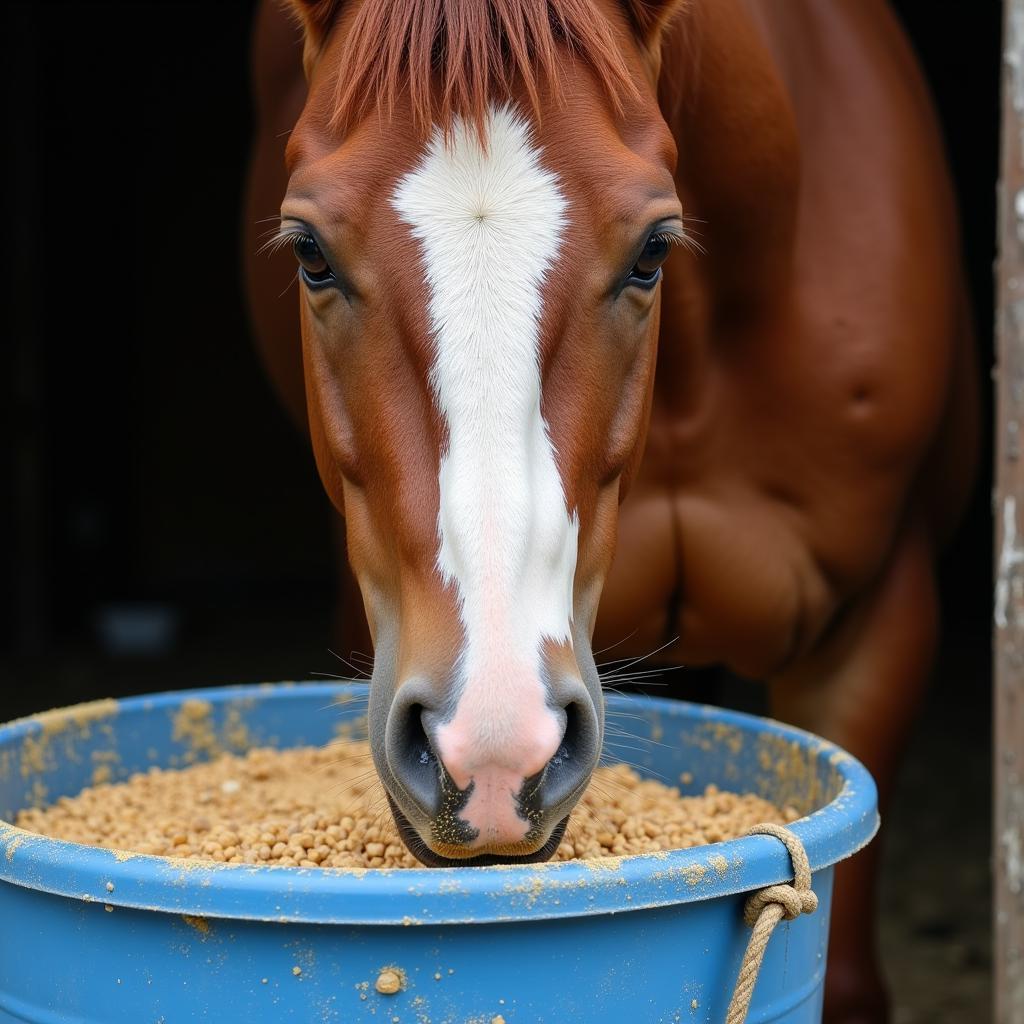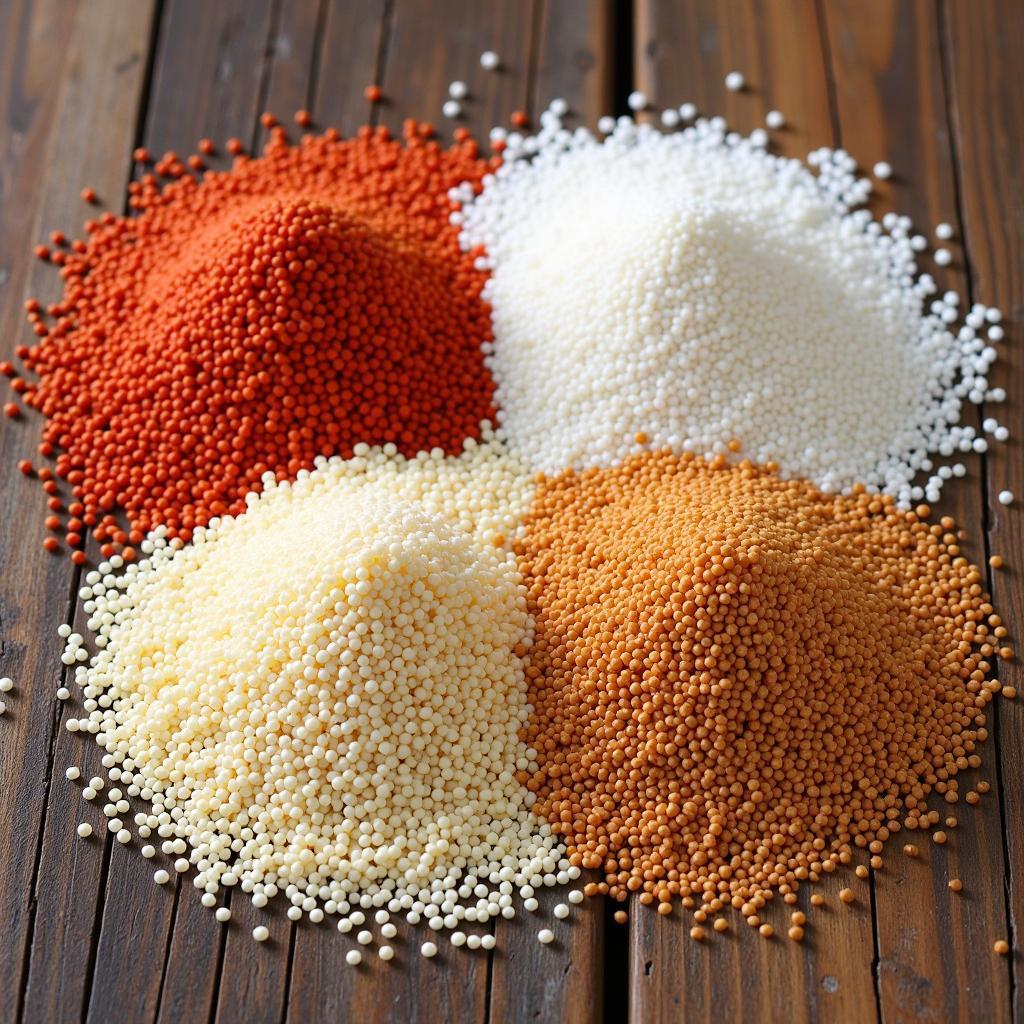Millet is a small-seeded cereal grain that’s become increasingly popular as a healthy and versatile food source for both humans and animals. But Can Horses Eat Millet? The answer is yes, horses can eat millet, and it can be a beneficial addition to their diet when fed correctly.
 Horse Eating Millet from Bucket
Horse Eating Millet from Bucket
Millet for Horses: Nutritional Benefits and Considerations
Millet is a nutrient-rich grain that offers several health benefits for horses:
- High in Fiber: Millet is an excellent source of digestible fiber, which is crucial for maintaining a healthy digestive system in horses. Adequate fiber intake helps prevent colic and supports optimal gut function.
- Rich in Minerals: Millet provides essential minerals like phosphorus, magnesium, and manganese, all of which are vital for bone health, muscle function, and overall well-being in horses.
- Source of Antioxidants: Millet contains antioxidants that help protect cells from damage caused by free radicals, contributing to a strong immune system and overall health.
- Low in Sugar and Starch: Compared to other grains like corn and oats, millet is relatively low in sugar and starch, making it a suitable option for horses prone to metabolic issues or those requiring a low-glycemic diet.
 Different Types of Millet Suitable for Equine Consumption
Different Types of Millet Suitable for Equine Consumption
Choosing the Right Millet for Your Horse
While millet can be a healthy addition to a horse’s diet, it’s essential to choose the right type and feed it appropriately. Here’s what to keep in mind:
- Types of Millet: Several types of millet, including pearl millet, foxtail millet, and proso millet, are safe for horses. However, avoid feeding Japanese millet, as it can be toxic to equines.
- Processing: Millet can be fed to horses whole, cracked, or as a component of a commercial feed mix. Whole millet may be less palatable and harder to digest, especially for horses with dental issues.
- Quality: Opt for high-quality millet that is free from dust, mold, and other contaminants. Store millet in a cool, dry place to maintain its freshness.
Incorporating Millet into Your Horse’s Diet
- Gradual Introduction: Like any new feed, introduce millet to your horse’s diet slowly to allow their digestive system to adapt. Start with small quantities mixed in with their regular feed and gradually increase the amount over several days.
- Moderation is Key: While millet offers several benefits, it should be fed in moderation as part of a balanced diet. The exact amount of millet to feed depends on the horse’s age, activity level, and overall health condition. Consult your veterinarian for specific recommendations.
- Monitor for Any Adverse Reactions: While rare, some horses may experience digestive upset or allergies to millet. Observe your horse closely for any signs of discomfort, such as loose stools, loss of appetite, or skin irritation, after feeding millet. Discontinue feeding and consult your veterinarian if any issues arise.
 Veterinarian Performing a Check-up on a Horse
Veterinarian Performing a Check-up on a Horse
Conclusion
Millet can be a nutritious and beneficial addition to a horse’s diet when fed responsibly. Its high fiber content, essential minerals, and low sugar and starch levels make it a suitable option for many horses. Remember to choose the right type of millet, introduce it gradually, feed it in moderation, and monitor your horse for any adverse reactions. When in doubt, always consult your veterinarian for personalized advice on incorporating millet into your horse’s diet.
FAQs
Can I feed millet to my pregnant mare?
Yes, millet can be a beneficial addition to a pregnant mare’s diet, providing essential nutrients for her and the developing foal. However, it’s crucial to consult your veterinarian for specific recommendations on the appropriate amount to feed.
Is millet suitable for horses with insulin resistance?
Millet is relatively low in sugar and starch compared to other grains, making it a potentially suitable option for horses with insulin resistance. However, it’s crucial to consult your veterinarian for personalized advice on managing your horse’s diet.
Can I grow my own millet for my horses?
Yes, you can grow your own millet for horses, provided you have suitable land and climate conditions. Ensure to choose a variety safe for horses and maintain proper growing practices to avoid contamination.
What are some signs that my horse may be allergic to millet?
Signs of millet allergy in horses can include digestive upset (diarrhea, colic), skin irritation (hives, itching), and respiratory issues (coughing, wheezing). If you observe any of these symptoms, discontinue feeding millet and consult your veterinarian immediately.
Where can I purchase high-quality millet for my horse?
You can find high-quality millet at most feed stores that cater to equine needs. Look for reputable brands and ensure the millet is fresh, clean, and free from any signs of mold or spoilage.
Need further assistance in caring for your equine companion? Don’t hesitate to reach out to us!
Contact Justus Horses USA:
- Phone: 0772127271
- Email: [email protected]
- Address: QGM2+WX2, Vị Trung, Vị Thuỷ, Hậu Giang, Việt Nam
Our dedicated team of equine experts is available 24/7 to address your questions and provide guidance on all aspects of horse care.